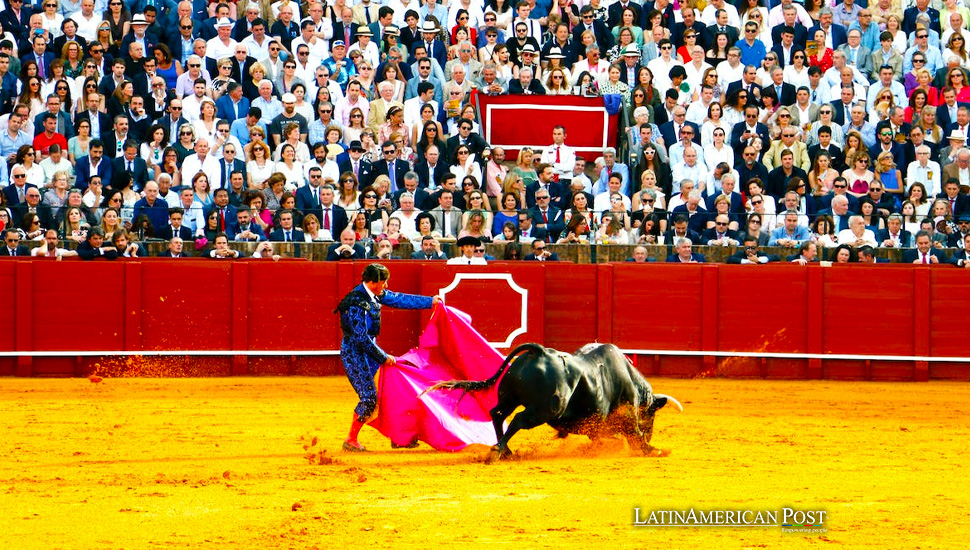Celebrity Voices Unite Against Bullfighting: A Battle for Compassion in Mexico

In the heart of Mexico City, a heated debate rages over the fate of bullfighting as a landmark trial unfolds. People for the Ethical Treatment of Animals (PETA) Latino, backed by celebrity voices, intensifies its campaign, demanding an end to bullfights at the iconic Plaza México.
Cultural Roots and Evolution: Bullfighting’s Origin in Mexican Society
Bullfighting, deeply ingrained in Mexico’s cultural tapestry, has long been a source of fascination and controversy. Rooted in Spanish colonial influence, the practice traces its origins to the early days of conquest, where it displayed power and dominance. Over the centuries, bullfighting evolved into a symbol of national identity, intertwining with Mexican culture and tradition.
However, as societal attitudes shift and ethical concerns emerge, bullfighting finds itself at a crossroads, grappling with questions of cruelty and morality. PETA Latino’s campaign against bullfighting represents a pivotal moment in Mexico’s cultural landscape, challenging age-old norms and advocating for compassion towards animals.
The organization’s crusade gained momentum on Tuesday as billboards adorned with striking imagery and powerful messages cropped up around Plaza México, the world’s largest bullfighting arena. Among the faces adorning these billboards are renowned Mexican actresses such as Kate del Castillo, Michelle Renaud, and singer Sherlyn González, lending their voices to the cause.
Visual Impact: Billboards and Symbolism
Kate del Castillo, famed for her portrayal in “La Reina del Sur,” is depicted with her hair twisted into horns, symbolizing the anger and resentment towards the resumption of bullfights. The billboards carry poignant messages denouncing the cruelty of bullfighting, with phrases like “Bullfights are idiocy. Let’s end them!” and “Some traditions deserve to die.”
Beyond the visual spectacle, PETA Latino’s campaign underscores a broader societal shift towards greater empathy and awareness of animal rights. The current trial holds significant implications for the future of bullfighting in Mexico. A tribunal will determine whether to grant a definitive suspension against bullfights at Plaza México following a lawsuit filed by the collective ‘All for the Love of Bulls.’
From Suspension to Supreme Court Ruling
The legal battle traces its roots to a provisional suspension granted to halt bullfighting activities at the arena. However, on February 2nd, a collegiate tribunal overturned this interim measure, pending the lawsuit’s resolution. The tribunal’s decision hinged on a prior ruling by the Supreme Court of Justice, which reinstated bullfights at Plaza México after a year and a half suspension.
The trial outcome carries weighty implications, reflecting Mexico’s evolving stance on animal rights and the ethical treatment of animals. PETA Latino’s campaign transcends legal maneuverings, seeking to spark societal reflection on the moral implications of bullfighting and its place in contemporary Mexican culture.
Michelle Renaud, one of the celebrities featured in the campaign, appears draped in a ‘bloodied’ cape, with the caption “Some traditions deserve to die.” Sherlyn González invokes the spirit of the Day of the Dead, urging contemplation on the horrors of bullfighting and the lives it claims.
Joining the chorus of dissent, Patricia De León, Sofía Sisniega, Dulce María, and María Celeste Arrarás lend their voices to the campaign against bullfighting. “Tormenting and killing bulls for the entertainment of a bloodthirsty few is not culture; it is cruelty,” asserts Alicia Aguayo, PETA Latino’s Associate Director of Communications.
PETA Latino condemns the brutal treatment inflicted upon bulls during bullfights, where they are subjected to exhaustion, provocation, and stabbing with lances and harpoons until they are ultimately killed. The organization decries the barbaric practice of trophy-taking, where matadors sever the ears or tails of conscious bulls as trophies.
Bullfighting’s Reach Beyond Borders
The battle against bullfighting extends beyond Mexico’s borders, gaining momentum internationally. Several Mexican states, including Coahuila, Guerrero, Quintana Roo, Sinaloa, and Sonora, have already banned bullfighting. A staggering 79% of Mexicans agree that bullfighting constitutes animal cruelty, with 57% supporting its prohibition.
One must delve into its historical roots and cultural significance to understand the depth of the debate surrounding bullfighting in Mexico. Bullfighting arrived on Mexican shores with the Spanish conquistadors in the 16th century, firmly embedding itself in the fabric of Mexican society.
Throughout Mexico’s tumultuous history, bullfighting served as a symbol of Spanish colonial dominance, a spectacle of power and control over both animals and indigenous peoples. However, as Mexico gained independence and forged its own national identity, bullfighting underwent a process of indigenization, intertwining with local traditions and customs.
By the late 19th and early 20th centuries, bullfighting had become a staple of Mexican culture, celebrated as a reflection of bravery, machismo, and national pride. The Plaza México, inaugurated in 1946, is a testament to the enduring legacy of bullfighting in Mexico, serving as the epicenter of the country’s bullfighting tradition.
Yet, alongside its cultural significance, bullfighting has faced mounting criticism from animal rights activists and ethical concerns from a changing society. The practice, characterized by the torment and killing of bulls for entertainment, has come under increasing scrutiny, prompting calls for its abolition.
Rise of Animal Rights Advocacy
In recent years, public opinion has shifted towards greater empathy and compassion for animals, fueled by growing awareness of animal rights issues and evolving societal norms. The rise of organizations like PETA Latino reflects this shifting tide, advocating for the ethical treatment of animals and challenging entrenched traditions like bullfighting.
Also read: Juan Luis Guerra’s Monumental Concert: A Tribute to Four Decades of Musical Mastery
As the trial unfolds, the outcome remains uncertain, poised to shape the future of bullfighting in Mexico. The fight goes beyond legal victories for PETA Latino and its celebrity allies; it represents a broader struggle for compassion and justice in a changing world. As Mexico grapples with questions of ethics and tradition, the battle against bullfighting serves as a microcosm of more significant societal debates surrounding culture, heritage, and the treatment of animals.




